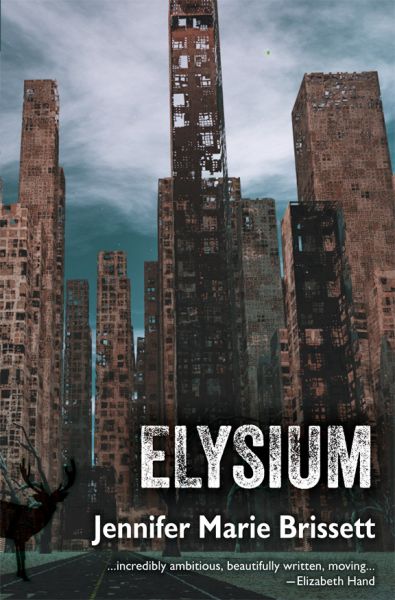A noteworthy debut
Elysium, Or, the World After
By Jennifer Marie Brissett

9 Mar, 2015
0 comments
December 2014’s Elysium, Or, the World After is Jennifer Marie Brissett’s debut novel. This work impressed enough readers that it was nominated for the Philip K Dick Award [link ] mere weeks after being published.
~oOo~
Adrienne’s world is falling apart. It isn’t just that she suspects her husband Antoine of planning to leave her. Reality itself seems to be fraying; she sees things — elk wandering through city crowds, owls lurking at her window — that nobody around her appears to see. Even the seasons themselves are not constant.
A chapter later and Adrienne is now Adrian, and the unfaithful Antoine has been replaced by a terminally ill Antoine. Desperate for solace, it’s Adrian who has a lover on the side. This does not indicate any desire on Adrian’s part to leave Antoine; it’s always Antoine who is leaving, whether by his own choice, or because of impending death.
The reality shifts continue. Adri[enne/ian]‘s gender proves fluid, as does the exact nature of the relationship to Antoine — lovers, siblings, parent and child— and time itself begins to shift forward but regardless of the reality around them the pair are always connected and always, it seems, threatened.
Unfortunately for the pair, the one consistent element in their mutable world is the direction of change in the world around them, which is degrading from unsatisfactory (with rumours of war) to bad to apocalyptic to post-apocalyptic to worse. The atmosphere has been seeded with agents that transform those unlucky enough not to find refuge deep beneath the surface. Every day, the contamination seeps deeper into the subterranean refuges.
~oOo~
The odd thing about reading this is that having first heard of this through online reviews I was expecting a work a lot more opaque than the one I got. Brissett, I thought, makes it perfectly clear, almost on the first page, why reality is shifting as it does. Why …. how to avoid spoilers here …. matters would happen in this way is perhaps unclear (although it is eventually explained) but what’s going on is obvious. Isn’t it?
It’s not that the author’s work is clichéd; it may be that excessive exposure to SF on my part has made it too easy for me to fill in the dots where genre fiction is concerned.
Brissett’s individual scenes are sharp and clear, as is her prose. I will admit that since what was going on was obvious to me, waiting for the author to reach the point where she felt the need to unify the narrative did drag … but only a bit. The individual scenes were nicely done.
At the risk of being spoilery, this book belongs to the grand tradition of showing what colonization feels like from the point of view of the colonized1. It sucks to be sitting on valuable real estate that more powerful cultures covet. This is an SF trope that goes back at least as far as War of the Worlds, and probably further; it’s still a rich source of inspiration.
Some authors have been tempted to provide the human protagonists of such dispiriting novels (or stories) with some last-minute out, some contrived weakness on the part of the invader, a sudden crisis of conscience, a poorly-foreshadowed wonder weapon. Brissett is exploring territory much closer to fiction like Disch’s The Genocides, and in very distant way, Russ’s We Who Are About To. This book is closer to historical accounts like The Diary of Ann Frank than it is to comforting pablum like Turtledove’s Worldwar series or Weber’s Out of the Dark. There is some consolation at the end but it’s of a thin, bitter kind.
Elysium, Or, the World After is available from Aqueduct Press.
1: There is, of course, also a tradition of fiction glorifying the process of colonization, curiously almost always told from the point of view of the colonizer.
